Marketing has long been considered a fairly gender balanced industry. The creativity and empathy required to persuade customers to buy products and services are traits that women are considered to possess in abundance.
And yet something curious happens when you step into the world of industry conferences and events.
Women are not found in such abundance.
It’s always been easy to find male marketing gurus populating speaker panels and keynote presentations. Yet it’s not been quite so easy to find female experts and female industry influencers in the same arenas.
Gender diversity at email industry conferences
Back in June 2016, self-professed Senior Email Nerd, Kristin Bond, wrote an article about the gender imbalance at the Email Innovations Summit in Las Vegas where only one of ten panelists was female.
Not only that, but other female speakers found themselves competing against hot topic panels and big industry (male) names. Which meant smaller audiences. And this had a knock-on effect as female speakers were seen as being less in demand.
But this was nothing new. Email marketing conferences had long been a lonely place for women.
On stage, at least.
As Vice President of Strategy Michelle Casey recalls: “when you think about where we were even five years ago, at events, the speakers were mainly men and a lot of the audience were women, so it was men speaking to women. And that was the landscape forever.”
Back when Michelle and fellow industry veterans Kath Pay and Jeanne Jennings started out, there were just a handful of female speakers on the international circuit.
And as Kath Pay, business owner, professional speaker and email marketing consultant, says, “it was a tough gig. I was more experienced and had better ratings than many males but they were given the keynotes. I had to work doubly hard to finally be given keynotes.”
Read the full interview with Kath Pay here.
Enter, Women of Email
It’s what drove Kristin, and fellow “email geeks” Jen Capstraw, April Mullen and Laura Atkins, to create Women Of Email to promote leadership among women within the email marketing niche.
Over the years, WoE has sought to cultivate the next generation of female thought leaders and speakers through a mentoring program that helps women with their conference proposals and presentation prep.
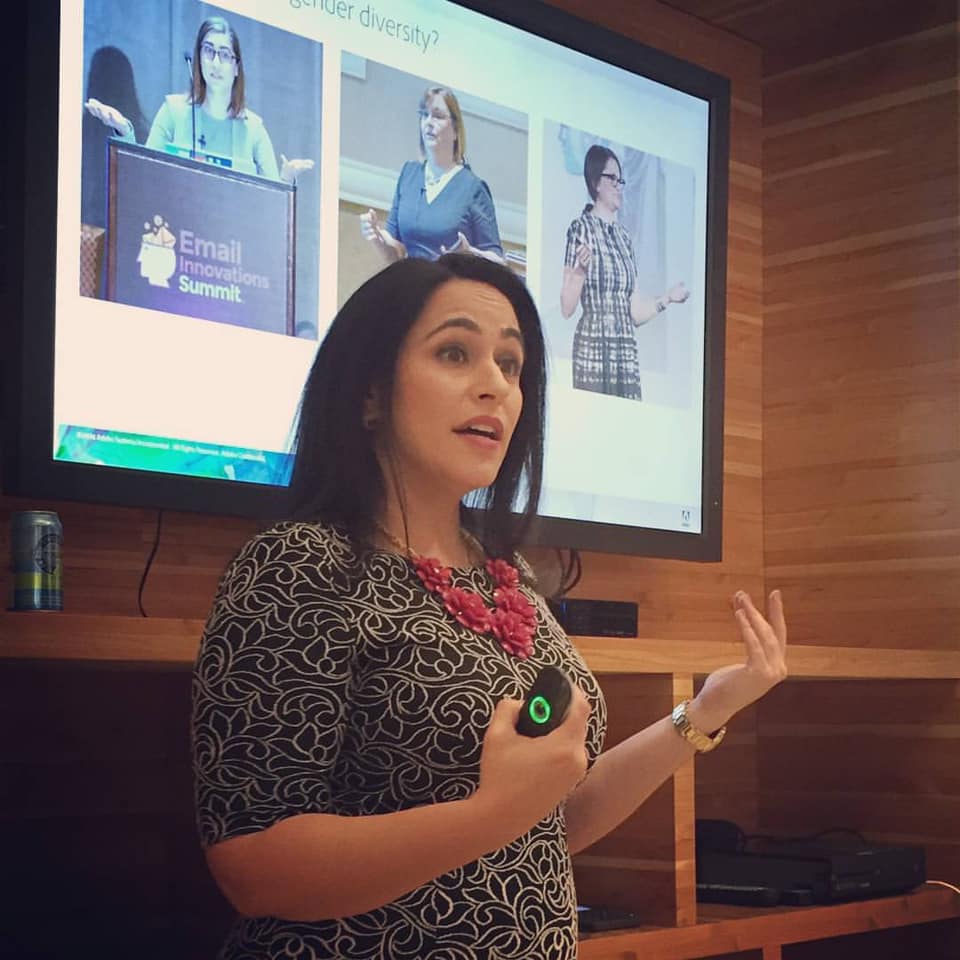
And the WoE Speakers Bureau puts this all into action by connecting female experts with conference and event organisers to put more women in front of an audience. Today, there are more than 1,500 women in the bureau.
There’s also a popular WoE Facebook group that provides a safe space where women can ask their peers questions about everything email marketing related without fear of being ridiculed or belittled.
And it’s professional networks and safe spaces such as these where women can overcome the common obstacles that hold them back.
What stops women from taking to the stage
Back in 1978, the phrase ‘imposter syndrome’ was coined by psychologists Pauline Rose Clance and Suzanne Imes. This fear and self-doubt that you don’t really know what you’re doing, despite your qualifications and experience, is something Email Developer Leah Miranda is all too familiar with.
Prior to working in marketing, Leah was a history teacher with no technical training whatsoever. After dedicating a year to learning how to code and landing a job in email marketing automation, she still felt she didn’t belong in this technical field.
Read the full interview with Leah Miranda here.
Evidence also shows that women are less self-assured than men. This disparity is commonly referred to as the ‘confidence gap’ and affects women at all stages of their career.
There’s a well-known statistic that women will only apply for jobs when they meet all of the qualifications required – no less than 100%. Whereas men will put themselves forward even if they only meet two-thirds or 60% of those qualifications.
But Michelle Casey is quick to highlight the issue with this approach: “If you think about that, you could never be at 100%. If you think you’re going into something at 100% and there’s a curveball that throws you off, then all of a sudden you’re like, ‘oh, I’ve failed, right? I didn’t get 100%’.”
Many female experts in the industry agree that it’s a lack of confidence that’s holding women back. That, and believing you need to master a subject before putting yourself forward to speak at an event.
But Jen Larson, Director of Marketing Technology, advises this isn’t the case – of course, you should be well versed in what it is you’re planning to talk about on stage. But you’re not expected to know everything.
Read the full interview with Jen Larson here.
Overcoming these obstacles
Ask women what they get out of networking groups like Women of Email, and ‘support’ is a word that comes up frequently.
Having a more senior industry player tell you on you’re the right track gives that confidence boost needed to stand by what you know. And perhaps even put yourself forward for a speaking gig.
Networking is also one of the best things you can do to advance your career, advises Jen Larson. By putting yourself out there and showing your peers the knowledge you have, you make a name for yourself.
For Kath Pay, the nurturing and mentoring in these networks is key. As she points out, email marketing is not something you specifically study at university, and very few professionals started out knowing they were going to specialise in this field.
And as a technology-driven industry, it is still somewhat male-dominated, making it harder for women to climb up the ranks. Kath sees email marketing as very much a best-practice channel, and people – women, especially – are nervous about broaching questions that might make them look stupid in front of their peers.
Sometimes it’s the need for a safe haven and reassurance from others that you’re doing the right thing. If your boss or company is asking you to do something that goes against everything you’ve learned, it’s gaining that confidence to stick to your guns.
And it’s even more important if you’re a single marketer without a team to support you, advises strategy director and keynote speaker Jenna Tiffany.
Read the full interview with Jenna Tiffany here.
We all need mentors and advocates
But don’t just look for mentors – look for advocates, recommends LoriBeth Blair, an email deliverability advisor. Align yourself with people who will champion you. People who will recommend you and put you forward for opportunities.
And men can be key here. Both LoriBeth and Leah have been lucky to have male colleagues and advocates who have pushed them on and helped get them speaking positions.
It’s also important to find a company that will support you. For LoriBeth, that means the opportunity to work with some of the biggest brands out there. If your boss is putting faith in you, it helps you believe in yourself.
Read the full interview with LoriBeth Blair here
Email marketing leader and international keynote speaker Kait Creamer has found that speaking at industry events is perhaps one of the best ways to network: “When you get up on a stage and are vulnerable and share your successes and your failures and your big ideas, people connect with you. I’ve met so many incredible people just from standing around after a talk and chatting about their stories.”
Read the full interview with Kait Creamer here
And to advance your career, putting yourself forward to speak at industry events certainly helps. By positioning yourself as an expert, you’ll have a stronger position from which to apply for that promotion. Or ask for that pay rise.
For Jenna, who has spoken at over 100 conferences, public speaking develops numerous other skills that highly benefits your marketing career: “I’ve learnt an enormous amount from speaking, such as how to deliver, how to convey a message, how to engage others, and how to control my nerves.”
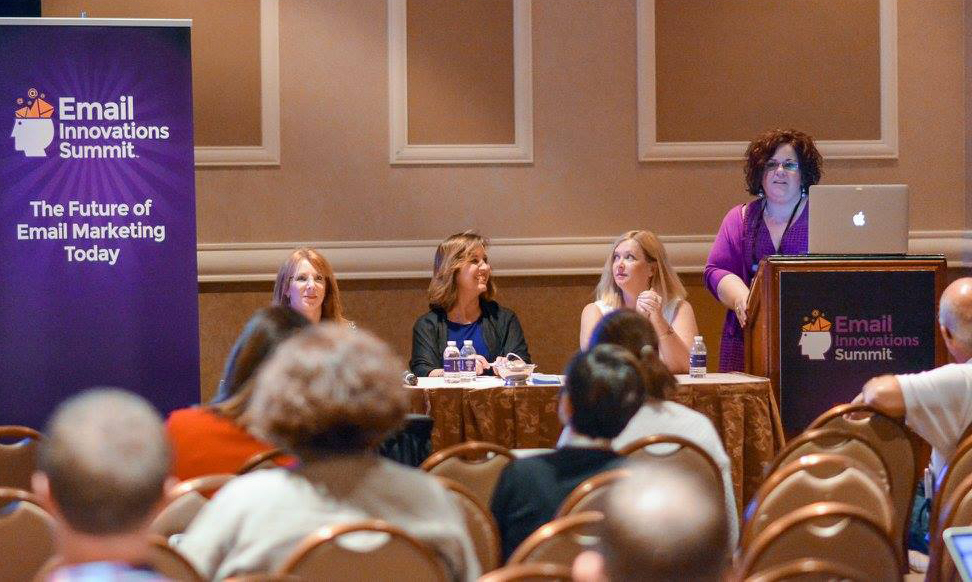
The tide of change
In the past, if conferences have not accurately reflected the gender split in the industry, the question is why. And the answer in many cases is that not enough women are putting themselves forward to speak at these events.
Michelle Casey points out that “it’s really easy for us to go to the sponsor of a programme to say ‘you should have a 50/50 panel of men and women’, and they’ll say ‘you’re absolutely right – we should have a big panel of women. But nobody’s coming up to volunteer to be those speakers’.”
Or at least not until recently.
If there’s one real noticeable change at these events it’s that more women are putting themselves forward. More women are recognising that they have something of value to share with the industry.
As chair of this year’s Email Innovations Summit in Las Vegas, Jeanne Jennings certainly had no issue sourcing women to speak. Four years on from when Women of Email was founded, 42% of speakers confirmed for the summit are women. That’s up 9% from 2016 and a well-balanced representation of gender.
But not everyone would agree.
Read the full interview with Jeanne Jennings here.
When equal isn’t enough
Even a healthy split like this isn’t good enough for everyone. It’s something Jeanne has seen vocalised on social media at industry events and conferences. And it’s something she’d rather not:
“If you go to a conference and there’s 48% women speakers and 52% men speakers, sending a nasty tweet about that doesn’t really help anything. I think constructive solutions, being civil with each other, open lines of communications, and trying to think about what’s best for the industry – that’s a positive change I’d like to see”.
Some event organisers are going to the opposite extreme.
At this year’s Shoptalk event, it’s an all-women line up of speakers. This was a conscious decision by the event organisers to “propel our industry forward and showcase many incredibly talented women who are working to transform retail in every way.”
LoriBeth Blair thinks it’s an interesting experiment and wonders what such a conference will look like – what difference having all-female speakers will make.
Shoptalk have also committed to a 50/50 split of male and female speakers every year afterwards.
But is this the right way to go?
For Kait Creamer, more needs to be done beyond who you put on stage:
“Normalize women everywhere—not just on a token ‘women in tech’ panel. Conference organizers too often attribute an imbalance in representation to the people applying to speak. They shrug their shoulders and say things like, ‘we didn’t have that many women apply to speak’, while also telling new mothers attending their conference to breastfeed in a bathroom stall. When women don’t feel welcome, they won’t step into a space just for the sake of helping your diversity.”
Whereas for Jeanne Jennings, it’s a matter of quality: “Now I’m programming a conference … I want to have the most knowledgeable person talking about whatever topic is being discussed. And I don’t really care whether they’re a man or a woman. I want the most knowledgeable person.”
The dangers of gender quotas
There are risks when trying to balance gender diversity through quotas. Instead of finding the best person for that speaking role, women are chosen simply to make up the numbers.
The debate around gender quotas suggests they’re not always so effective. And to commit to a balanced split in female/male speakers despite an uneven gender ratio in the pool of speakers applying to these events can seem superficial.
For Kath Pay, an all-female panel of speakers at her Holistic Live! A Morning Together event was a happy accident. Her network of mentee marketers and clients happen to be mostly female. So she had a greater pool of female experts to approach as speakers – and thankfully they all said ‘yes’.
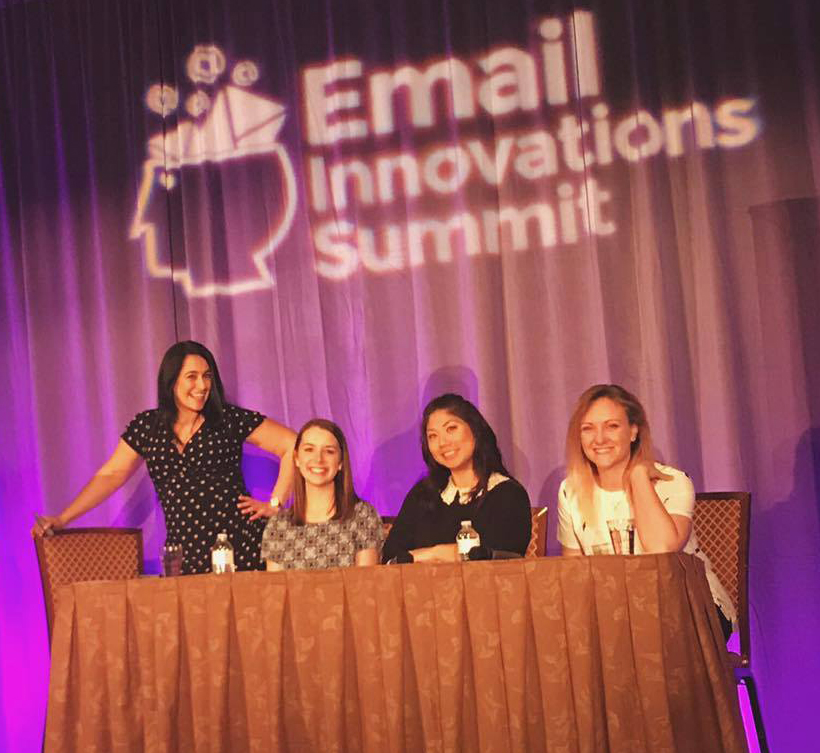
The demand for greater diversity
In just a few short years there’s clearly been a positive change in the gender diversity found at email marketing conferences and events.
But a sentiment echoed by many industry experts is the need to broaden the definition of the word ‘diversity’.
Starting with ethnic diversity.
“I really don’t see a lot of women of colour or women of different backgrounds being represented”, says Jen Larson. “Even men of colour and men of different backgrounds, and I know they’re out there! I’ve met them, I’ve seen them but I think that’s the next step – to get them some visibility.”
Kath Pay agrees: “It [email marketing] tends to be a very white-centric industry for some bizarre reason”.
It’s something that bemuses Michelle Casey: “How many times do we have to hear the same people up there telling everybody how they did an amazing job? I want to hear everybody telling me how they did their amazing job and that’s a much better conference.”
For Alice Li, an Asian American woman and the Principal Email Engineer at Litmus, representation is often a self-perpetuating cycle. And it requires brave individuals in a position to give exposure to under-represented groups to break that cycle:
“The first time I spoke at a Litmus Live conference, a young Asian American woman came up to my table afterward and told me how inspired she was to see someone who looked like herself up there — it never crossed her mind before that she could be doing the same thing. I was really moved by that, because I understand that feeling entirely.”
LGBT and accessibility
For Leah Miranda, it’s time event organisers tapped into the LGBT community. She raises the point that “the way I view the world and communicate with the world, in email and everything like that, is vastly different than my straight male counterpart.”
She also suggests we look at other types of diversity, specifically people with disabilities: “… accessibility is a big topic, and we need to hear from those individuals and how they interact with our content in email or on the web.”
As accessibility in email marketing becomes ever more important, it’s only right that those affected by these issues should share their experiences with the industry.
Advice from the industry experts
Whatever your gender, ethnicity, sexual orientation or disability, it’s clear that the email marketing industry wants to hear your story.
So if you’re thinking of speaking at an industry event, here’s some advice from the trail blazers that have gone before you.
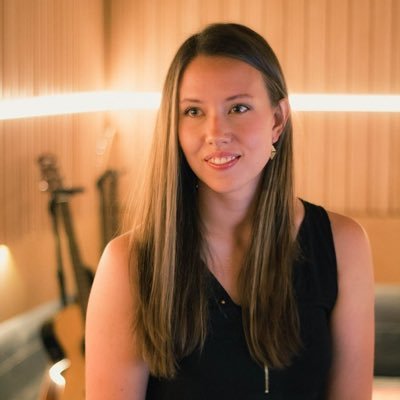
“Don’t wait until you think you’re ready – you’re never ready but it’s always worthwhile! Apply to things you think you have no shot at. Give a talk on something super technical that you love but you think the audience might find boring. Look for the things that get you excited—those are the things you should speak about.”
– Kait Creamer

“Take the jump and put yourself out there. If you’re speaking for the first time, perhaps make it as part of a panel so that you’re on the stage with other people that can help you work on that presentation. And don’t be afraid to ask questions.”
– Jeanne Jennings
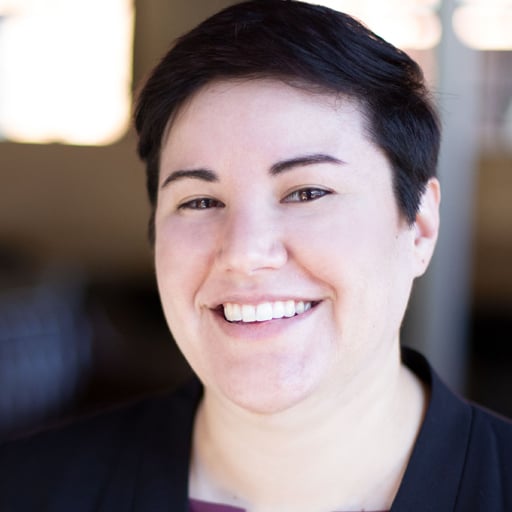
“Just go for it! And remember who you are. I know it sounds cheesy but before I apply for anything and before I go on stage, I just say ‘remember who you are – you’ve got over a decade of experience, you’ve got this, this and this’ and it’s this kind of self-talk that we need to go out and stretch ourselves.”
– Leah Miranda
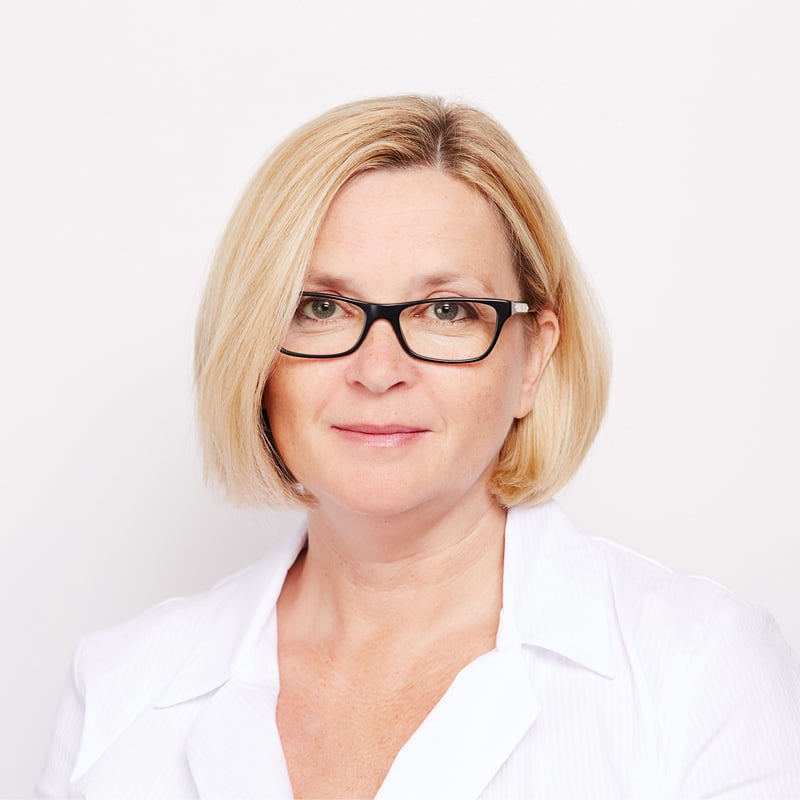
“If you’re just starting out, don’t be afraid to assimilate everything that other speakers, authors, experts and thought leaders have said about your topic. Get to know that content and then start bringing in your own content. Once it’s your own – in practice and in thought – that’s when you start to speak more powerfully, because you know it intimately and you’ll be more confident.”
– Kath Pay
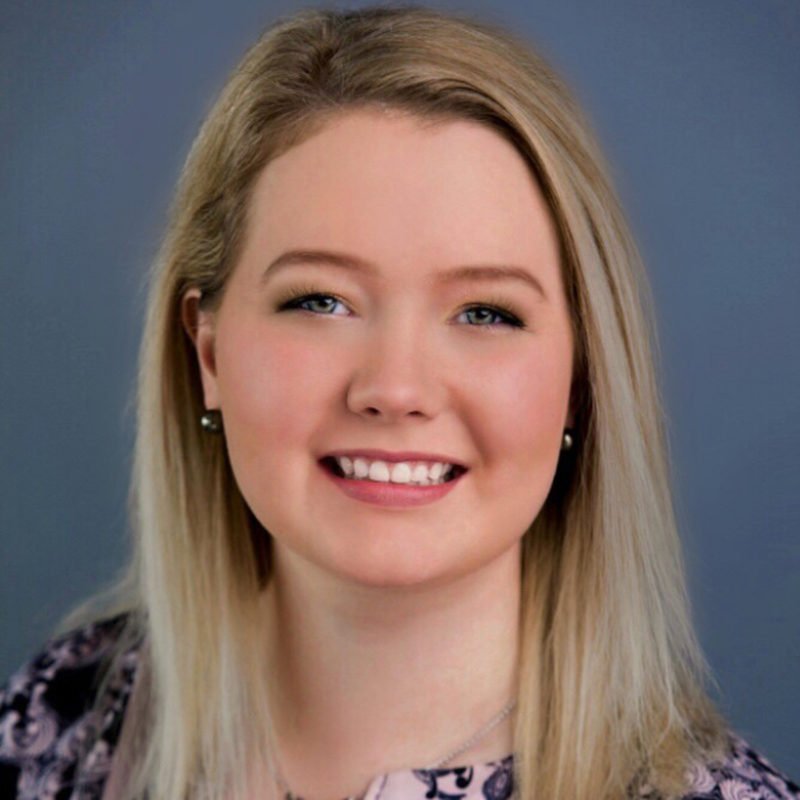
“Try not to isolate yourself to women’s groups. WoE is great and it’s helped a lot but don’t exclude the rest of the industry from potentially being a mentor or being someone that you could look to and learn from as well.”
– Jen Larson
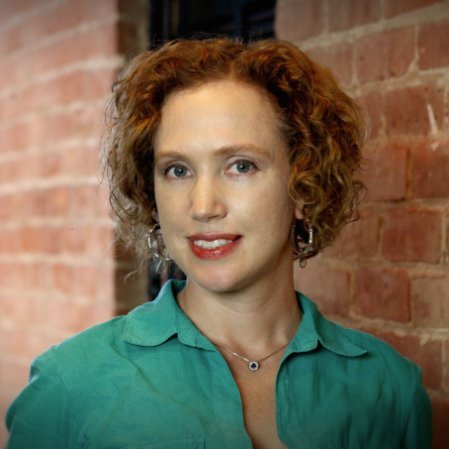
“You don’t have to have done something for 16 years to be an expert, it could just be a few years having done it. If you have a story to tell, raise your hand because there will be people interested in hearing your story. There is no lack of desire to be able to read up on other people’s experiences with such a specialised niche.”
– Michelle Casey
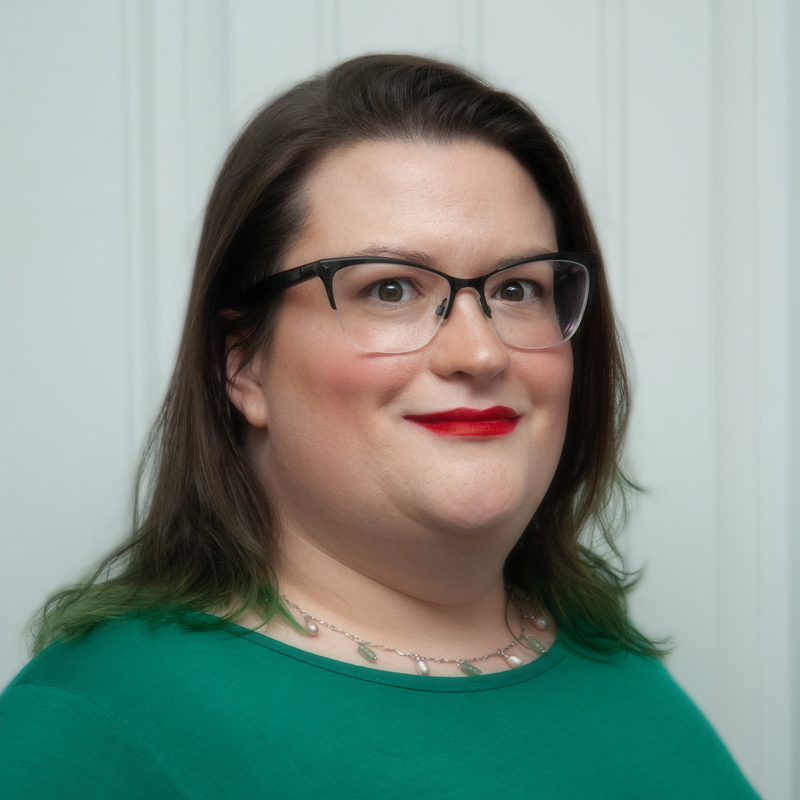
“The best advice I would say is, don’t give up. It’s going be hard, it’s going be harder than it seems like it was for your male counterparts. But don’t give up, you can do it.”
– LoriBeth Blair
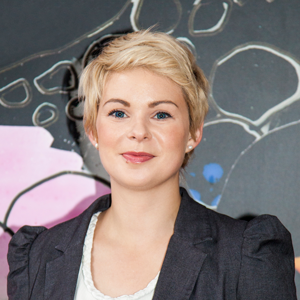
“Get used to watching yourself back from a recorded talk, critique yourself to improve. Let’s be honest – you will always be your worst critique, so try not to give yourself too hard a time. Focus on the value your talk will bring an audience and the insightful experience you can share. Most importantly – go for it!”
– Jenna Tiffany
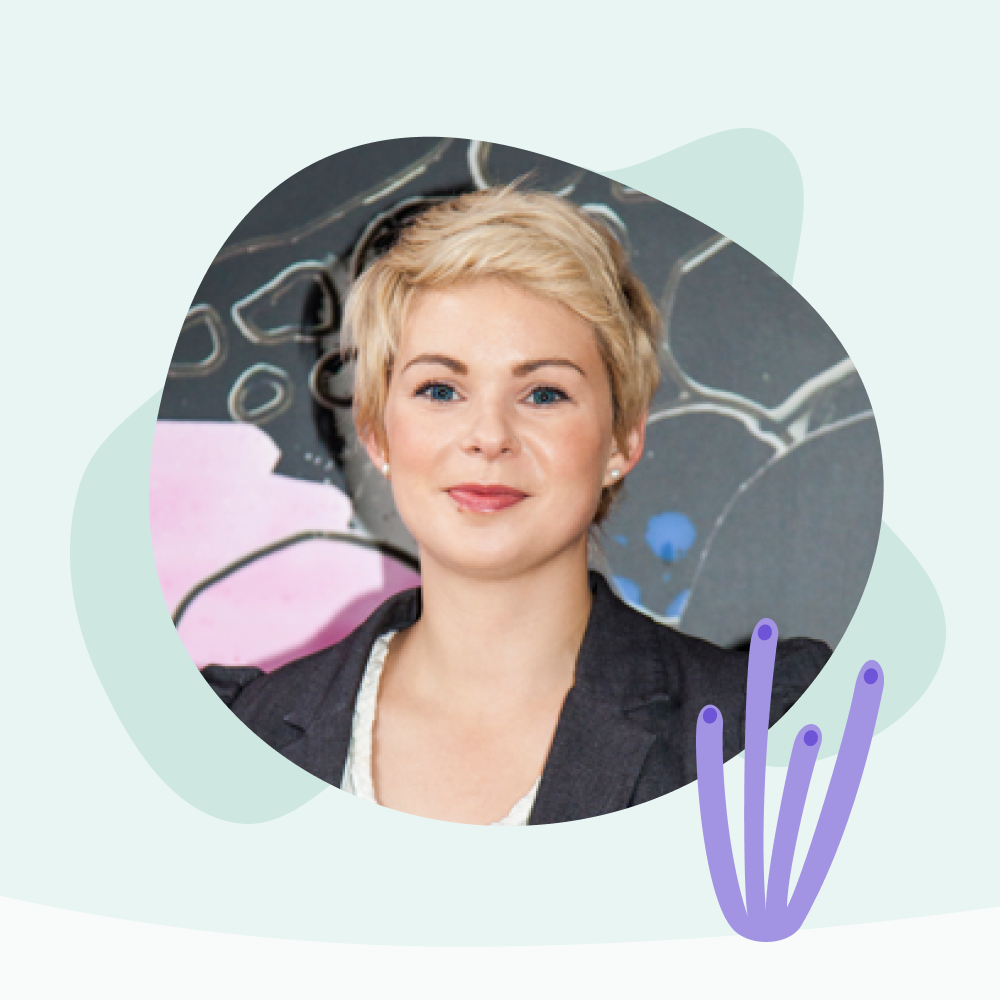
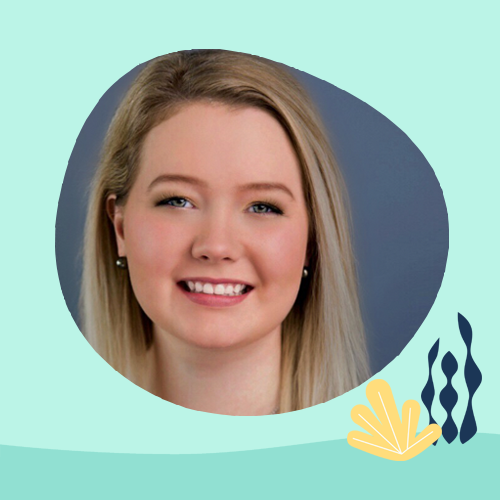
No Comments
Leave a comment Cancel